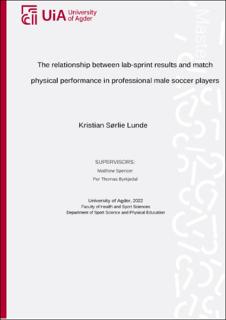| dc.description.abstract | Aim: This research study aims to examine the relationship between lab-sprint performance and match physical performance in professional male soccer players.
Methods: Eleven professional male soccer players (25.5 ± 3.4 years, 183.8 ± 5 cm, and 78.3 ± 4.9 kg) competing in the second-highest division in Norway participated in this research study. Sprinting performance was assessed by the players performing 30-m linear sprints at an indoor location using dual-beamed photocells, whereas match physical performance was monitored using a 10Hz GNSS device embedded with a 100Hz inertial movement unit (Catapult Vector S7) during seven official matches. Selected match play variables included total playing time, total duration, total distance, meters covered per minute, distance covered by high-speed running (19.8-25.2 km/h), distance covered by sprinting (>25.2 km/h), and maximal velocity (m/s).
Results: Moderate evidence was observed for the association between 5-m lab-sprint performance and distance covered by high-speed running (BF10=4.9). Anecdotal evidence was observed for the association between 10-m, 15-m, 20-m, and 25-m lab-sprint performance and distance covered by high-speed running (BF10=1.00-2.18). Similarly, anecdotal evidence was reported for the association between 10-m lab-sprint performance and peak speed during match play (BF10=1.04), and peak lab-sprint speed and peak match play speed (BF10=2.04).
Conclusion: The majority of the lab-sprint performance parameters did not show more than anecdotal evidence for associations with match physical performance. Thus, the 30-m lab-sprint test used in this research study did not reflect the players' physical abilities during match play.
Keywords: Elite football players, laboratory testing, sprint capacity, player monitoring, match play performance, high-speed actions. | |
